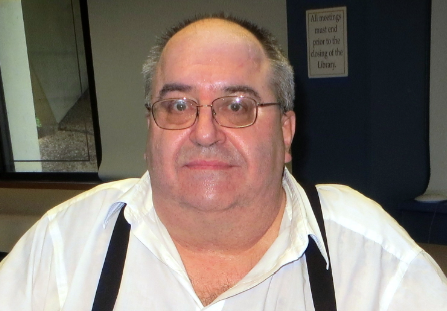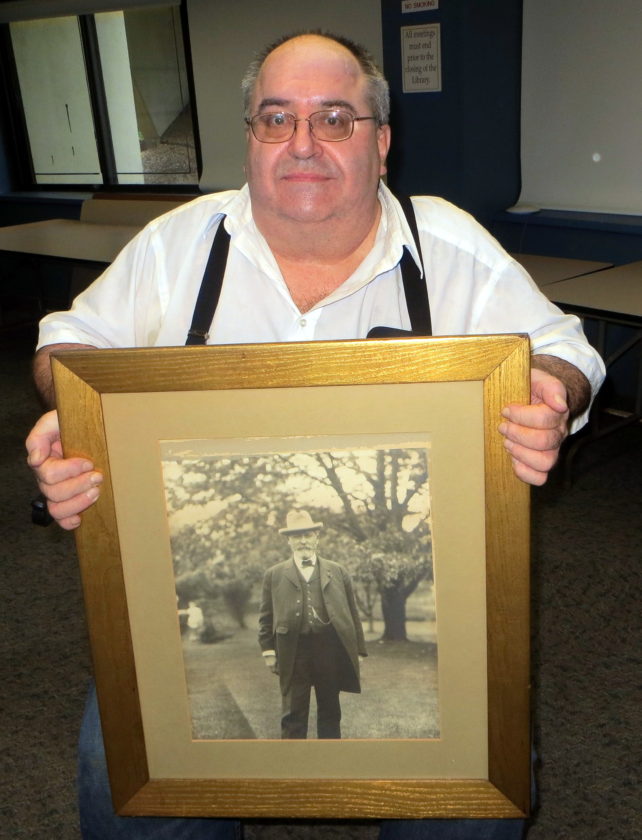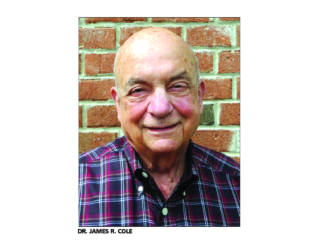
BY HILLARY VIDERS
SPECIAL TO NORTHERN VALLEY PRESS
ENGLEWOOD, N.J.—Jay Wolf, a brilliant archivist and database technology specialist, is an invaluable asset to the Englewood Public Library, where he has worked for over 18 years.
Wolf is currently head of the library’s technical services, which involves the ordering and processing of all library materials. He has also taught database searching and using the Bergen County Cooperative Library System (BCCLS).
Wolf has a Bachelor of Science and Bachelor of Humanities from Sierra Nevada College and a Master of Library and Information Science from Pratt Institute. His majors were history; hotel, motel, and restaurant management; literature; philosophy; and social science. He minored in art and science.
As a trained archivist, Wolf has worked on various projects at the library. He has given lectures on the library’s postcard collection and recently on the history of the Englewood library buildings.
Wolf is a member of the American Library Association as well as the New Jersey Library Association, and also a member of the Institute of Electrical and Electronics Engineers, the world’s largest technical professional organization for the advancement of technology, and Association For Computing Machinery.

• • •
Hillary Viders: During your college years, you certainly had a rich experience! What inspired you to study so many different subjects?
Jay Wolf: I had a wonderful college experience at Sierra Nevada College. One of the founders, Gilbert Ralston, was a mentor to me. He was an author, screenwriter, and playwright. He even wrote an episode of “Star Trek.” The college itself offered many outstanding opportunities. For example, we took a field trip to France for an assignment on the upcoming Olympics and we stayed at a three-star hotel in Val Thorens.
HV: Computer technology seems to have revolutionized library services and it is in use everywhere. Does this technology have any downsides to it?
JW: The biggest downside is that people don’t know how much information they can access on line if they take the time to learn about it. Your library card can access over 100,000 articles and entire magazines, like Consumer Report, for free. You can access this material without even coming to the library. You can email it to yourself or listen to it.
Just a few of the search engines available to the public are Academic Search Premier (which offers more than 4,600 journals), Business Source Elite (which provides full text for over 1,000 business publications) and EBSCO (which offers more than one million high-quality e-book titles and 100,000 audiobooks from more than 1,500 major academic publishers and University Presses from around the world).
If you have an Englewood Library card, you can download the free Hoopla digital mobile app on your Android or iOS device and enjoy thousands of free movies, televisions shows, e-comics, music albums and audiobooks.
HV: So many people are using Kindle and electronic devices for reading books nowadays, and bookstores are dwindling. Do you think that paper books and book stores will someday be a thing of the past?
JW: Never! There are some bookstores in the United States that will always be in demand, such as those in college towns. The large retail bookstores, like Barnes and Noble, will be downsizing or offering electronic technology. The stores that don’t follow the technology, like Sears, will go out of business. On the other hand, small book stores often remain popular because they offer things that the large chain stores may not, such as works and appearances by local authors.
The Englewood Public Library will continue to draw people, because it has Wi-Fi and other computer resources. Also, we have kids who come to the library because they have assignments that require them to use a book, and we have summer reading programs that use books. Not everything is electronic! For some people, it is easier and more enjoyable to read the book.
HV: Many people come across old books when they clean out their attic or the houses of deceased family members. How can someone know if a book, especially a signed edition, is a prized collectible worth a jackpot of money?
JW: Jackpots can come in different forms. In Massachusetts, someone went through a barrel of books in an antique store and he found a book by a popular Boston author. It turned out to be a first edition of Edgar Allan Poe. But, just having a signed edition of a book does not make it valuable. Authors sometimes sign 100,000 copies of their books.
If you want to learn the value of a book, the best thing to do is to show it to a reputable appraiser that specializes in rare books. There are several in New York City. You can also look in Kovels’ Antiques and Collectibles Price Guide (now in its 51st edition in 2018).
HV: The Englewood Public Library currently has over 100,000 books and materials, so your job of ordering and cataloguing them must be a daunting task. How do you go about it?
JW: Systematically! I use a number of professional journals, such as Forecast, published by Baker and Taylor, and online calendars that tell me what is being published in advance. I also use The New York Times, the Wall Street Journal, the New Yorker and Fresh Fiction, and a variety of other sources.
We also have a subscription with Baker & Taylor that has 400 authors that will automatically be shipped to us, so that saves some time.
Collection development is a very difficult job, in the fact that you’re not only looking at the title and subject matter, but also the price. Many books, such as art books, are extremely expensive. Fortunately, the library purchases art books from the Yale University press with an endowment from a former resident, Charles Henry Booth Chapin (after whom Booth Avenue in Englewood was named).
For collection development, you also have to know the population, and I have to be nonjudgmental in what I order. I take into account the tastes of the local residents. I know that in Englewood we have a mosque as well as synagogues and churches of different denominations, so what I purchase takes that into account. I also purchase books in Spanish and Korean. I’ve already picked 110 books for 2019, and I may get more.
We also have a suggestion box for items that people want us to buy and I try to accommodate as many feasible requests as possible.
HV: In your career, you’ve come across many thousands of books. Do you have any personal favorite authors?
JW: Dickens.
HV: Why Dickens?
JW: Because he tells simple stories.
I took an advanced class in “Moby Dick,” where everyone was struggling to gain insight into the “spirituality” of the book. To me, it was just a fish story—a man lost his leg, etc.
In another example of literary overreach, after a speech that T.S. Eliot gave, during the Q&A, someone asked him, “Does ‘The Wasteland’ [his most famous poem] signify this, this and this?” Eliot just looked at him and said, “Maybe.”
HV: Through your presentations at the library, you have educated people about many aspects of Englewood’s history. What do you find most interesting about this city?
JW: For one, the many famous people that have lived here, such as Charles Lindbergh, Vince Lombardi and the Countess Poniatowski [who lived in Gloria Crest, the estate built for her by her husband, Count Stefan Poniatowski]. In 1936, she wrote a copious diary that chronicled the house’s priceless furnishings, and it’s amazing to read.
There are also many people who have made important contributions to Englewood, such as Dwight Morrow and Whittie English, a Tuskegee Airman who founded English Realty Associates, a business that opened up Englewood for low income and minority buyers after World War II.
Englewood has always been a melting pot of outstanding citizens, including musicians, artists, educators, innovators and philanthropists.



